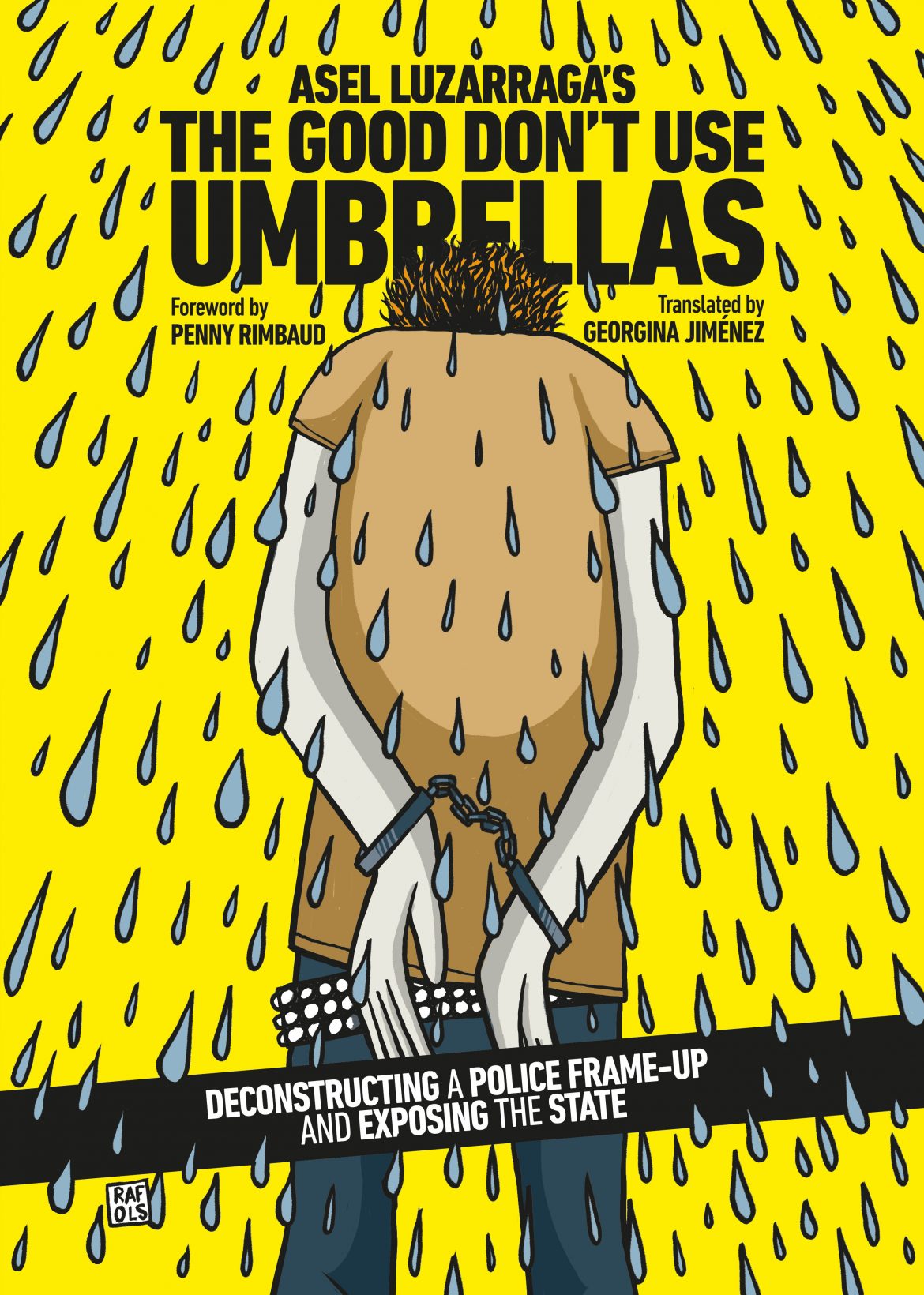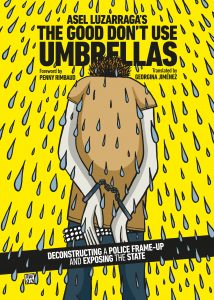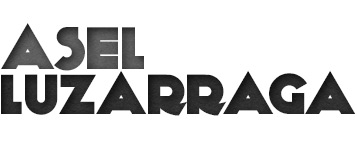
 Argitaletxea: Active Distribution
Argitaletxea: Active Distribution
Urtea: 2.023
Orrialde kopurua: 135
*Behean utz ditzakezu liburuari buruzko iritzia edo oharrak.
Liburu honetan 2.009 eta 2.010 bitartean Txilen bizitzea tokatu zitzaidan egoera islatzen saiatu naiz, autobiografia, kronika eta hausnarketa politikoak uztartuz. Egoeraren berezitasunak eta luzaroan jasotako elkartasun zabalak gaztelaniaz idaztera eraman ninduten.
Hau Los buenos no usan paraguas liburuaren ingelesezko bertsio moldatua da. Bertan lagun askok lan egiten dute elkar-laguntzaren esangura erakutsiz. Jayk heldu zion liburua Erresuma Batuan argitaratzeko erronka 2014an, Buenos Airesen elkar ezagutu genuenean, eta bide luzearen ondoren, utopia zirudiena egia bihurtu da. Bidean beste lagun batzuk batu ziren: Gavin, Georgina, Jon, Jim, Kinna… Eta, noski, hitzaurre dadaista harrigarria idatzi zuen Penny Rimbaud, anarkopunkaren mito bizia. Azala, berriz ere, Lluís Ràfols lagun handiari zor diot. Haiei guztiei, Punk Ethics kolektiboari eta Active Distribution argitaletxeari, eta seguruenik ahaztu ditudanei eskerrik asko.
In December 2009, Basque punk Asel Luzarraga appeared on every news outlet in Chile, in handcuffs, under arrest and accused of terrorism against the state. A Self-proclaimed anarchist and a celebrated author in his home country. Asel had moved to Chile not long before. Bur the evidence against him didn´t stack up. His arrest and trial made for a political thriller of police corruption, state oppression and media manipulation that did not hesitate to make links with ETA, international terrorism and Mapuche violence. The Good Don´t use Umbrellas is the chronicle of those events, told by its protagonist.
***
Asel Luzarraga’s story is a poweful reminder of the vindicative, arbitrary power of the state and the vulnerabilities of anarchists and others to persecution and oppression. The Good Don´t Use Umbrellas is an important addition to anarchist prision literature and also attests to the power of international solidarity, endurance and determination.
(Ruth Kinna, author of The Government of no one)
Irakurtzeko zatia
I found myself in the social landfill of the Chilean state. And we mustn’t deceive ourselves. Jails, from the moment when they became a permanent institution, even though hollow official speeches may try to dress them up, have been conceived as a way of social reinsertion and to separate, at least temporarily, the pieces that came out defective in the human chain of fictions that starts with schooling, or even before through the patriarchal family as an institution that today is in the process of re-adapting to new interests.
It should be enough to consider the phrase “penitentiary center” to understand what the subject is here. According to that definition, these are centers in which to do penitence. That, at least to me, brought to mind immediately the self-imposed punishments of religious ministers from various sects after taking note of their sins, that old human invention to control people through the scrutiny of external censors: conscience. In this way, penitence, pain, shame and suffering were imposed through confession to sinful religious ministers as the only method of expiation, the suffering of the flesh to heal the suffering of the spirit.
In the same way that in religion the list of sins as the regulator of social behavior in primitive communities is determined by an enlightened group at an indeterminate moment, harking back to the beginning of time and mythology, today there is an even wider list of laws that shields itself under an unknown principle of the legitimacy of sovereign states, the fiction of independence, that is nothing but illegitimate appropriation of the violent use of weapons and salaried armies so that the people’s will is submitted to an apparently superior being. That list of laws is transformed and expanded – it rarely gets shorter – based on the will of a small elite that, as per the “partyocracy” in which we have been educated under the prostituted name of democracy, emptied of any original meaning, by which the people appear to, or are made to, delegate. This system is particularly tyrannical and illegitimate with regard to indigenous communities like the Mapuche, who never chose by their own will to belong to that state or the aforementioned capitalistic partyocracy, but who are made to relegate any decision making that affects them even when they may not know of them and are then forced to respect them by the force of violence.
Another one of the limbs constitutes the mass media – those newspapers, televisions and radios that belong to the same clans as the landowners, the mining, forest and energy corporations, the football clubs and, of course, the high military and government echelons. As no one dares to bite the hand that feeds their disinformation and poison, they target communities in order to criminalize them, to create enough social fears to legitimize persecution and punishment. They indoctrinate as well as numb and entertain, and finally praise the oppressive successes that they have themselves encouraged, pointing their finger towards the final destination: jail, the penitentiary, “redeeming” punishment.
And that is how we got to where this chapter started: the penitentiary. The function of jails is not to repair possible damage, rehabilitate the one who injured their neighbour or community, the chance to reflect, remake and compensate in a constructive way that allows him/her to revalue themselves as human beings, reach an agreement with the affected party, assume a deal that involves and enriches morally and spiritually both parties, but is senseless revenge without objective or mission. For that, of course, in such places of confinement the prisoner must endure, be sad, suffer, be humiliated, turn into nothing, be annulled. And that is what the uniformed officials are for, without ethics, morals or higher human responses to any of the human waste they guard but through coercive methods that hang from their belts and are usually effective.
Liburu osoa jaits dezakezu epub edo mobi formatuan (gazteleraz), baita DVDa ere.
